Femme Filmmakers Festival 2022: Competition Shorts, Days 1–3
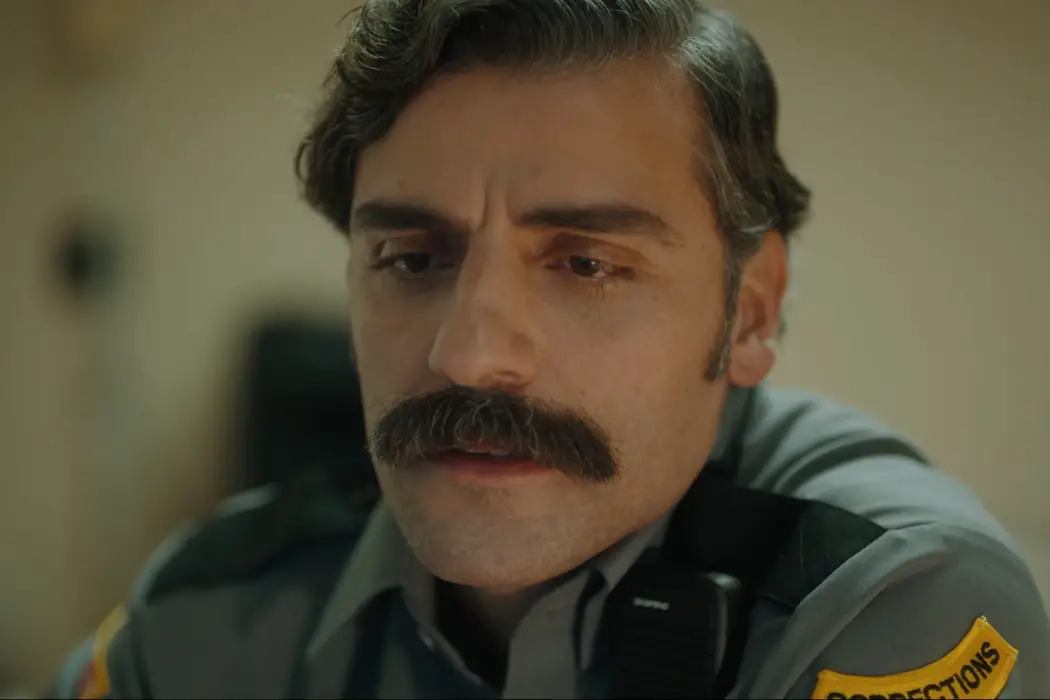
Film critic, Ithaca College and University of St Andrews graduate,…
The Femme Filmmakers Festival is in its seventh year, run by Filmotomy and partnering with MUBI, In Their Own League, and InSession Film. The online festival comprises a showcase selection and a feature film section for all 10 days. In its competition selection for 2022 are 20 short films, which, like all films at the fest, are directed by women, and which show for days one through nine. This year, in 2022, the festival runs from Sept. 23 to Oct. 2.
The competition shorts of the first three days of Femme Filmmakers Festival 2022 range from apocalyptic one-woman disaster theater to star-studded dramas. These stories follow fry cooks and refugees. They deal with doppelgängers and abortion clinics and women who spontaneously faint. Some of the films are available to watch online.
The Letter Room (Elvira Lind)
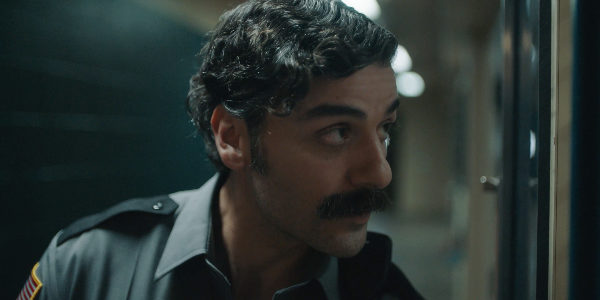
I love Oscar Isaac. I love watching Oscar Isaac eat fast food and get vanilla milkshake all over his Tom Selleck caterpillar mustache. But beyond the veneer of the Dune star’s measured taciturnity, carefully gelled hair, and reserved grace, his character of Richard Alsonso-Munoz, a lonely but friendly Latino prison guard, is an enigma.
The quiet dramatic 2020 short The Letter Room, written and directed by documentarian Elvira Lind and nominated for an Oscar back in 2021, begins with the easy swirl of the humdrum — first the aforementioned burger and milkshake, which Richard half-eats before he starts his shift, then Richard goes to work, meekly waves to colleagues and supervises the exercise of death row inmate Jackson (John Douglas Thompson). The boss (Eileen Galindo) calls him into her office to reassign him to the mail room — it’s a big responsibility, she tells him, as he has to vet all the incoming and outgoing mail.
Soon enough, the disconsolate Richard stumbles on provocative letters from a woman, Rosita (Search Party’s Alia Shawkat), to her guy on death row, Cris (Brian Petsos). The letters sing with a deep romantic poetry that Richard doesn’t find in his late-night telenovelas or his time spent feeding plátanos to his adorable little doggie. But they’ve all gone unanswered. And Richard, with a bit of creepy romanticism that would make Hitchc*ck proud, begins to fantasize about Rosita and possibly live vicariously through her letters — the lover he never had, whom the man behind bars doesn’t seem to want.
Lind’s experience as a documentarian sharpens the film’s beautifully close camerawork, as cinematographer Sam Chase follows Richard with gritty handheld fascination. Lind frames him as a man on a mission, hopelessly committed to the fool’s errand of romancing this woman on the other end of a prison mail room, an admirable sad sack who thinks he’s bigger than the institution that envelops him.
The cast is roundly excellent, particularly Shawkat, smartly underplaying a character Lind spends so much of the short building up. Thompson is a smooth, steady presence, amiable and mellow-voiced enough for the reveal that he’s also a death row inmate to catch you off-guard. And Isaac naturally commands the film, with Richard’s neatly pressed uniform and that mustache that seems to absorb his mouth. His jitters and longing stares complement how kind of unsexy his character is here. Isaac plays against type to great effect (he and Lind are married, so clearly she trusts him with the material). The Letter Room is a cute, empathetic film to start off day one of FFF7, full of vérité charm and epistolary magic.
The Letter Room is available to rent on Apple TV, Google Play, and Topic.
Hot Singles (Laura Jean Hocking)
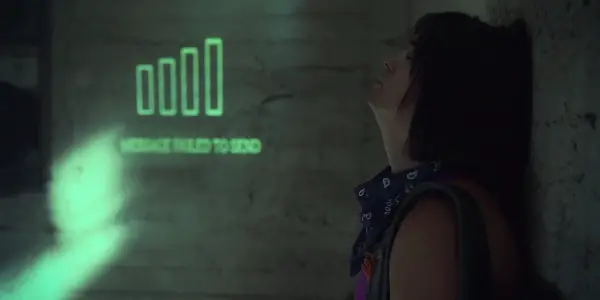
Femme Filmmakers Festival 2022’s first day also saw Hot Singles, a lean, impressive short from writer-director Laura Jean Hocking. Hocking has a pretty prolific career of short film editing, so of course she makes the most of Hot Singles’ nine-minute runtime. Unfolding somewhat like if the basement interlude in War of the Worlds were a one-woman play, Hot Singles finds a panicked news reporter, Daisy (Shannon Walton), hiding away in the bottom floor of a flower shop while some sort of apocalypse unfolds outside.
In such a short time, Hot Singles gives us a full portrait of Daisy — who she is, where she comes from, what she cares about, and how she feels about the world potentially ending — achieved by Hocking’s surprisingly trippy script and direction and Walton’s incredible performance as Daisy.
Daisy goes from capable, hardened survivor, crashing into the basement in goggles, a backpack, yoga pants, and a bandana mask like a hip wasteland bandit, to a desperate psychological mess, as she stays in the basement, pleading for rescue… or at least a cell signal. She can’t text her dad, but the only texts that seem to be coming through are from a pesky “hot singles” hotline, and clearly, she’s got more important things on her plate.
It crescendoes to a pretty dour, dark punchline, but Walton makes a meal out of the role, and Hocking and company seem to have fun evoking both a post-apocalyptic world unfolding outside the flower shop as well as a particularly fraught, fractured psychology within Daisy. The short, with its propensity for projections and nonlinear editing, is so trippy that any amount of it can be hallucinatory or a bad dream or maybe even postmortem — it depends on your interpretation, or how willing you are to play ball with the film’s mysterious Armageddon.
Hocking edits the film with relish, hacking up Daisy’s time in the basement to make hours stretch on like days or weeks. What might have been one long afternoon feels like a whole winter spent at the Overlook Hotel — and judging by the cracks that show in Daisy’s psyche, they might as well be. Cinematographer Sarah Fleming projects Daisy’s weather reports and dream sequences against the basement wall while she sleeps, and during the day, she indulges in this metallic sickly green color, both in the lighting and the color grade, which only further sells Hot Singles’ ominous apocalypse.
Ultimately, Hocking’s story isn’t about the end of the world but about gender, about the exploitation of women and the perverse isolation they can be forced into when the male-dominated space around them seems to only see them as objects for pleasure. Walton’s alternately exasperated, manic, and snarky performance is pitch-perfect for the small-scale postmodern disaster story Hot Singles is trying to be — imagine if the phone sex hotline were the only number that works after the end of the world. Eat your heart out, Rod Serling; that sounds like a scary Twilight Zone episode to me.
Strangers (Nora Longatti)
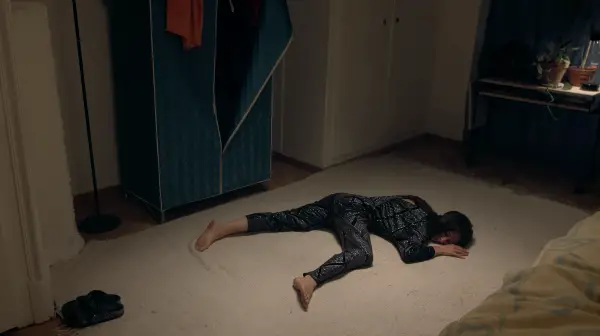
Day two’s short Strangers begins with a woman (Fyunhue Gao) collapsing. It’s OK; this happens all the time. Or so you might think, judging by the blasé reactions of the people around the apartment building when it happens. When she collapses inside, or at the store, the response is still very muted, caring, and prepared rather than the hysterical shouts one might expect. (When she’s in a restaurant or at a bus stop, however, and around people who maybe don’t know her as well, the response is much more panicked.)
The French-language Strangers is writer-director Nora Longatti’s second short film. (She does the music as well, which is a standout here.) It has a much different pace than the other films in competition; its editing style is languid and its shots long, making every cut and closeup hit so much heavier and harder, the way they do for Pham Thien An’s Vietnamese slice-of-life short film Stay Awake, Be Ready, or even the patience-testing minimalism of Tsai Ming-liang’s Walker short. The collapses might be the most shocking element of Strangers, but the fun comes in seeing everyone’s reactions to the falls, how her community ignores her, rallies around her to support her, or joins her in lying on the floor.
This nearly silent short follows the nameless woman as she buys groceries, does the laundry, and works in her job as a hotel cleaning lady. The plot, loose though it is, is in the romance, which slowly grows under the surface like mushrooms, until it finally emerges from the soil of the film in the final minute.
Strangers excels at instilling in the viewer a sense of inevitability and vulnerability — this collapsing, which the protagonist seems to have no control over, throws her at the mercy of the people around her, yet she never seems to rely on others, and moreover, she sometimes lies down of her own accord, to take advantage of her fainting spells to meet her beautiful downstairs neighbor. The film is a mystery — it is unclear whether she faints by choice or by some medical condition, just as it is unclear whether the film is supposed to take place in reality or not — but it’s a patient, engaging mystery, one worth enjoying even if it can’t be solved.
Polished (Colleen Dodge)
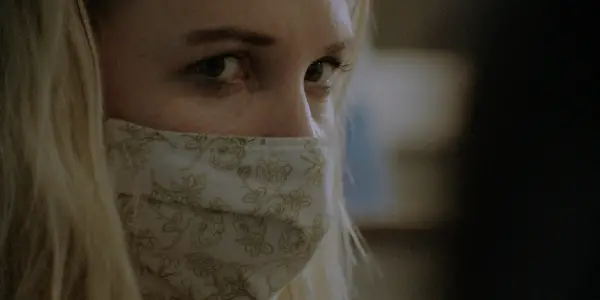
Unease and anxiety permeate Polished, a six-minute dramatic short from Colleen Dodge. The film starts a bit like a horror movie — before we even glimpse our main character, Jane (Jane Stiles), we see her nail polish being scraped off, in extreme closeup. The scraping is both rough and delicate, careful not to touch the skin but determined to shred off the bright-red polish. The sound design, from mixer Jason Mendez and composer Max Phillips, is at once oppressive, startling, and uncomfortable, the scrapes deep and distorted, as though they’re happening in the middle of a deep pipe.
Jane has an appointment later that day — an abortion, though Polished is so incredibly subtle in its script and presentation that much of this context is provided through symbolism and audio and visual cues. How Jane avoids a phone call during her nail appointment, her nervous and inquisitive behavior, the attention she pays to a mother and child on the subway, and the overwhelming sonic bustle of New York City compared to the brown-noise stillness of the clinic all serve to establish the decision long before one realizes what Jane’s doing. The only literal image we ever get that this is a film about abortion is when she’s in the doctor’s office, in one shot of Jane’s foot placed in a stirrup.
Stiles is exceptional in the role. The film is very pandemic-minded, with temperature checks at the clinic and Stiles remaining masked for much of the middle of the film, meaning her expressive eyes have to do some heavy lifting to tell you about Jane’s state of mind at the nail salon, her thought process on the subway and in the clinic reception room, and her anxiety as she waits to be called in for her procedure. Once she’s lying down in the procedure room, you see the complete vulnerability and erosion of confidence in Stiles as she breaks down crying.
We’ve seen plenty of abortion road trip movies before — Never Rarely Sometimes Always, Plan B, Unpregnant, Grandma — that show how many barriers sexist, oppressive state laws in the U.S. place between women and proper reproductive care that allows them for autonomy over their own bodies. It’s not clear if Jane is a New Yorker or not (where abortions are legal and protected by law), but Polished focuses completely on the emotional toll of such a decision and procedure — even when abortions are widely accessible within a state, they’re still traumatic, and Polished, in dedicating itself to laying bare Jane’s state of mind and vulnerability, tries to convert Jane, and women who seek abortions, into actual dramatic, realistic characters you can relate to rather than abstract statistics.
Dodge’s work before Polished, her debut short, is mostly in the art department, having worked on indie features like Monsters and Men, Beach Rats, Maggie’s Plan, and First Reformed — all very grounded, low-budget, evocative films, and Dodge uses that experience to craft a very sparse mise-en-scène that centers the character and her psychology above all else. Dodge and her cinematographer, Andrew Wonder, represent the procedure, and the countdown as Jane’s meds take effect, by showing flashes of her day and her past relationships, like an evocative shot of two hands parting in front of a blue background. We’re left with a very affecting final shot of her fingernails being painted white, which suggests such a brilliant and complicated visual metaphor of renewal, but also of temporary fixes, and the healing process after Jane’s procedure.
Polished is free to watch on Vimeo.
Moon (Zoé Pelchat-Ouellet)
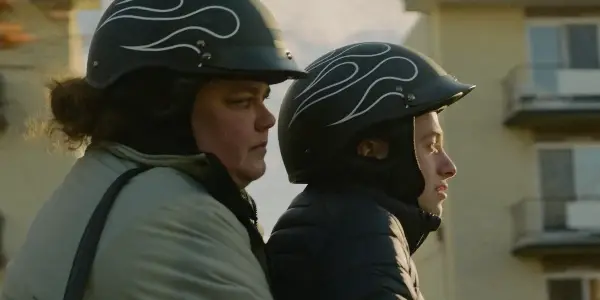
Sabrina, also known as Babz (Joanie Martel), is a short-order cook at a restaurant — aka one of the hottest jobs a person can have. She’s got very low self-esteem — she had recently been released from prison (we never learn details), her apartment’s a bit of a mess, and she gets the sense that many people around her think she’s unattractive due to her weight and appearance. Chief among these detractors is Raul (Alexandre Lavigne), her “supportive” gay coworker who, as it happens, is actually extremely toxic and not very supportive at all.
Moon is a French-language Canadian short that spends its 15 minutes tracing Babz’s metamorphosis into an independent, confident woman. She crushes on a hot customer (Reda Guerinik) and gets the courage to ask him out to dinner, and Raul and his friend, Félix (Guillaume Gauthier), try to help Babz prepare for her big night, or at least celebrate over drinks and loud music.
Written and directed by Zoé Pelchat-Ouellet, Moon quickly drifts into the sort of kitchen-sink drama of which there are already tons of short films, but what sets it apart is its empathetic, kind eye toward Sabrina and its slow, graceful camera movements, lensed by Derek Branscombe. Smart cinematic flourishes abound, as in a scene where Babz hopefully looks up at the moon and the melody on the soundtrack beautifully fades into the diegetic ambience of the fancy restaurant she’s dining at date. We never learn whether or not her date shows up. And frankly, it doesn’t matter — Moon is about one woman realizing her beauty and worth, about starting to fill in all the holes and insecurities that plague her, and Pelchat-Ouellet achieves this beautifully.
Babz begins the short making nervous eye contact with everybody she encounters, never sure of herself but always certain that she’s not what anyone wants — one thinks of the great cinematic Sabrina, Audrey Hepburn, in Billy Wilder’s Sabrina, who starts the film as the unassuming, plain (well, as plain as Hepburn can be) daughter of a wealthy family’s driver. She lives above the garage and pines for one of the brothers her father works for, but of course, he never notices her. After a long sojourn in Paris for culinary school, she returns posh, educated, and beautiful, having unlocked some part of herself that allows this ordinary driver’s daughter to become… well, Audrey Hepburn. Babz undergoes a similar change in Moon, realizing that the biggest barrier to appreciating her own beauty is her own low opinion of herself — and she does it all without enrolling in culinary school.
Freedom Swimmer (Olivia Martin-McGuire)
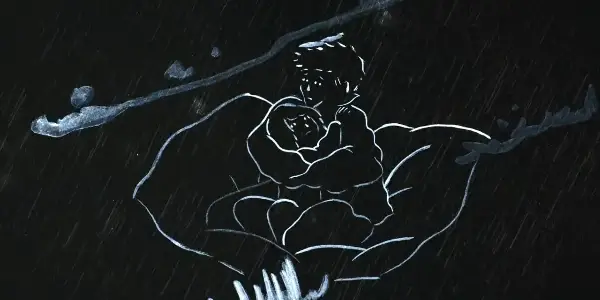
Watching Freedom Swimmer feels like witnessing a miracle. Director Olivia Martin-McGuire, born in Australia and living in London, spent many years in China and Hong Kong. She directed China Love, a documentary about China’s wedding industry, and now has made Freedom Swimmer. The short film, which runs about 15 minutes, has no credited actors or crew, so as to keep them anonymous, given the controversy of its subject matter.
Faced with oppression from the People’s Republic of China and several extreme famines in the postwar years between 1950 and 1980, the proemial text in Freedom Swimmer tells us, about two million people fled China for Hong Kong. The easiest way, the narrator tells us, was to swim. This was a 5- or 6-mile swim at least. There was always the danger of sharks, or of being dragged under by waves, washed back to Chinese shores, or being picked up by patrol boats. Three million who tried to make this journey either died or were captured and punished. “Now a new generation of political refugees is fleeing Hong Kong,” the text tells us.
Freedom Swimmer is a combination of soft-focus live-action reenactment, animation, and archival footage. That footage is split between the 1950–80 period of immigration and the modern political turmoil in Hong Kong. Modern protests in Hong Kong push to maintain self-government against China, while the Chinese government tries to introduce laws to pre-screen Hong Kong government candidates, allow for extradition from Hong Kong back to China, and implement invasive security measures. Previous documentaries about the protests, such as Revolution of Our Times, similarly do not disclose cast and crew names for fear of reprisal by the Chinese government.
Our narrator is a grandfather being interviewed by his granddaughter. Grandpa escaped China with his daughter when she was just a child. Through her eyes, we see their animated leaps through the hills in the dark, multiple attempts at crossing the sea, and eventual arrival on Hong Kong shores, Grandpa cutting his feet on oyster shells as he drags their makeshift raft onto the sand. The documentary is brief and relies more on the emotionality of oral history rather than the historically one might get with a more traditional approach. And this doc is haunting — chalk sketches of refugees huddled in the woods, fleeing from gunfire, are nightmarish, as is the short’s recurring motif of cascading bodies, falling like rain.
In the end, we pull back in a Black Sabbath–style reveal that the dining room the grandfather and granddaughter are talking in is actually a film set and that the two are really just actors who don’t even show their faces. The anonymity is a stark reminder of the battles still being waged to protect Hong Kong, as well as the role that film can play in bringing their stories to life.
The Mirror (Giulia Achenza)
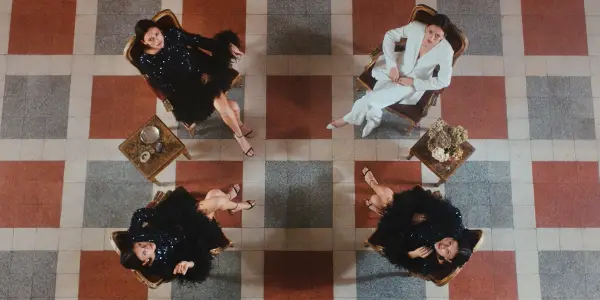
Perhaps it’s the luxe dresses, or maybe it’s the lack of dialogue, but the sub–three-minute short The Mirror has an air of the old-fashioned to it. This is, like The Letter Room, Hot Singles, Polished, and Moon, a story about psychology — and like some of them, it plays with reality. A model (Ben Massarenti) in a gorgeous white coat walks along a reflective pool, then we cut to them standing in a large common room, the light streaming in through the windows like it’s Maxim de Winter’s Manderley estate. Something feels haunted.
The Mirror is a jewelry ad. But let’s not hold that against it — Miu Miu’s Women’s Tales series, for instance, has allowed the best female filmmakers of our time, like Isabel Sandoval, Miranda July, Mati Diop, and Agnès Varda, to make short films using its clothing; and even titans of cinema like Martin Scorsese and Luca Guadagnino have made advertisements before — Scorsese for Dolce & Gabbana and Guadagnino for Valentino with The Staggering Girl.
In The Mirror, promoting Avel Lenttan’s The Mirror Collection, director Giulia Achenza has a novel way of incorporating the earrings into the narrative: The model is confronted by an alternate version of themselves, dressed in black. Are they meant to be a repressed part of the protagonist’s personality? Do they represent the protagonist’s desires or their darker impulses? Is this a Black Swan situation? Regardless of the interpretation, the earrings play a key role — the “real” version of the model wears one set, while the “mirror” version wears another. Cinematographer Stefano Etter frames the compositions so that no matter which earrings the model wears, you can appreciate the lovely triangular trinkets dangling from Massarenti’s ears. (A single pair of those earrings can pay for the entire short film production, in case you were wondering.)
Achenza includes some stylistic flourishes like color-toned, kaleidoscopic shots of the mirror-self dancing, and another scene where, in an Under the Skin–like void, the two models meet face to face.
Conclusion:
The opening film for the festival was Maysaa Almumin’s J’ai Le Cafard. Other showcase titles were Public Relations from Thomas H. Stewart and Elle Jae Stewart and Heroines from Katia Badalian on day two; and Mazdey Snob’s Mijo and Wallace Chan – The Art of Materials from Martina Margaux Cozzi on day three.
Feature films for the first three days were Heidi Ewing’s Spanish-language I Carry You with Me and Julia Ducournau’s Palme d’Or-winning Titane on Sept. 23; then Elizabeth Lo’s dog doc Stray, Amy Poehler’s YA Netflix comedy Moxie, and Lili Horvát’s Hungarian romance Preparations to Be Together for an Unknown Period of Time for Sept. 24; and Sept. 25 saw Jasmila Žbanić’s Oscar-nominated Quo Vadis, Aida?, Jenny Gage and Tom Betterton’s coming-of-age doc All This Panic, and Payal Kapadia’s Indian documentary A Night of Knowing Nothing.
Learn more about the Femme Filmmakers Festival and see their 2022 selection here.
Does content like this matter to you?
Become a Member and support film journalism. Unlock access to all of Film Inquiry`s great articles. Join a community of like-minded readers who are passionate about cinema - get access to our private members Network, give back to independent filmmakers, and more.
Film critic, Ithaca College and University of St Andrews graduate, head of the "Paddington 2" fan club.













